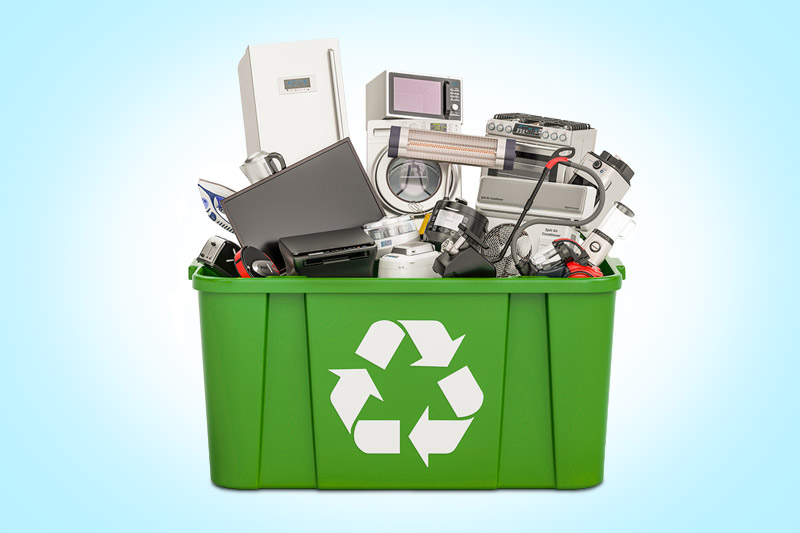R2 Certification Electronics Recycling: Your Warranty for Accountable Disposal
R2 Certification Electronics Recycling: Your Warranty for Accountable Disposal
Blog Article
Elevate Your E-Waste Management With R2 Certification: an Extensive Review
In the realm of responsible electronic waste monitoring, the relevance of applying efficient methods can not be overemphasized. As innovation quickly progresses, the demand for appropriate disposal and recycling of electronic tools has ended up being significantly important. One trick approach to raise e-waste monitoring techniques is by attaining R2 qualification. This accreditation stands as a trademark of quality in the area, representing adherence to rigid requirements that make certain environmentally sound techniques. By discovering the procedures and benefits associated with R2 qualification, a deeper understanding of exactly how it can transform e-waste management approaches emerges, dropping light on a course in the direction of sustainability and honest disposal practices.
Importance of E-Waste Management

When e-waste is not handled properly, these poisonous compounds can seep right into the ecosystem, creating damage to wild animals and potentially entering the food cycle, positioning dangers to human wellness. The inappropriate disposal of e-waste contributes to air pollution and greenhouse gas emissions, intensifying climate modification and environmental deterioration.

Advantages of R2 Qualification

First of all, R2 certification improves credibility by showcasing an organization's devotion to lasting methods. It ensures clients, companions, and stakeholders that the business follows rigid requirements for e-waste monitoring - r2 certification. This trustworthiness can result in increased count on and improved partnerships with clients who focus on environmental duty
Second of all, R2 certification assists reduce dangers connected with improper e-waste disposal. By complying with the rigorous standards stated by the qualification, companies can reduce the probability of data breaches, environmental contamination, and legal repercussions. This proactive strategy safeguards the firm's online reputation and lessens possible responsibilities.
Last but not least, R2 accreditation demonstrates a dedication to ecological stewardship - r2 certification. By responsibly handling digital waste via certified processes, companies add to the conservation of resources, reduction of air pollution, and promo of a circular economy. This dedication not only benefits the environment but additionally aligns with advancing consumer assumptions for lasting service techniques
R2 Accreditation Process Overview
Having developed the advantages of R2 accreditation in promoting reputation, risk reduction, and ecological stewardship, it is vital to currently detail the comprehensive procedure included in her latest blog obtaining this qualification. The R2 certification process begins with a thorough testimonial of the company's functional plans and procedures to make sure compliance with the R2 requirement. This initial assessment is vital in recognizing any type of gaps that require to be attended to before proceeding better.
Once the organization's techniques line up with the R2 common demands, an independent third-party auditor carries out an on-site audit to evaluate the implementation and effectiveness of these techniques. This audit includes an extensive evaluation of paperwork, meetings with staff, and physical inspections of facilities to confirm conformity.
Following an effective audit, the company obtains a qualification choice based on the auditor's searchings for. If accepted, the organization is approved R2 accreditation, showing its commitment to accountable e-waste management. It is very important to keep in mind that maintaining R2 qualification calls for ongoing conformity with the criterion's requirements and periodic audits to guarantee continued adherence to best methods in e-waste recycling and disposal.
Key Criteria for R2 Compliance
A necessary aspect of attaining R2 compliance is ensuring that all electronic waste (e-waste) handling facilities meet rigid ecological and safety requirements. To follow R2 demands, organizations need to stick to key requirements that focus on accountable e-waste administration methods. These criteria consist of implementing a documented environmental, wellness, and security management system, ensuring the protected handling of data-containing tools, and carrying out detailed downstream due diligence to track the last destination of e-waste materials.
Furthermore, R2 compliance demands the proper testing, refurbishment, and recycling of electronic tools to prolong its helpful life and minimize environmental influence. Facilities seeking R2 qualification have to also prioritize employee health and wellness by giving essential training, personal safety devices, and a secure functioning environment. In addition, maintaining in-depth documents of e-waste handling activities and on a regular basis undertaking audits by accredited certifying bodies are vital elements of showing recurring conformity with R2 requirements.
Influences of Lasting E-Waste Practices
The application of sustainable e-waste methods based on R2 conformity not only makes sure ecological and safety criteria are met however likewise significantly influences the general lifecycle of digital products. By sticking to R2 criteria, digital waste monitoring procedures become extra effective, reducing the ecological impact of digital products. Lasting e-waste methods facilitate the appropriate disposal of electronic parts, making certain that unsafe products are dealt with sensibly and do not end up polluting the environment.
Additionally, lasting e-waste methods can contribute to work development in the recycling and repair markets, cultivating financial growth while promoting ecological duty. In general, the adoption of sustainable e-waste methods under R2 certification offers as a vital action in the direction of achieving a much more environmentally lasting electronic devices sector.
Final Thought
Finally, implementing appropriate e-waste monitoring techniques is important for ecological sustainability and source preservation. R2 accreditation plays a key role in making sure responsible handling and disposal of digital waste. By sticking to the strict requirements set forth by R2 requirements, organizations can not only lessen their ecological impact yet likewise add to a more sustainable future for generations ahead.
One key approach their explanation to raise e-waste administration techniques is by acquiring R2 certification. By exploring the procedures and benefits linked with R2 certification, a deeper understanding of just how it can change e-waste management approaches arises, losing light on a course towards sustainability and ethical disposal methods.
The R2 qualification procedure begins with a complete testimonial of the company's functional policies and useful site treatments to ensure conformity with the R2 requirement. If authorized, the organization is approved R2 accreditation, demonstrating its dedication to responsible e-waste administration. Generally, the fostering of sustainable e-waste techniques under R2 qualification serves as a crucial action towards attaining a much more environmentally lasting electronic devices industry.
Report this page